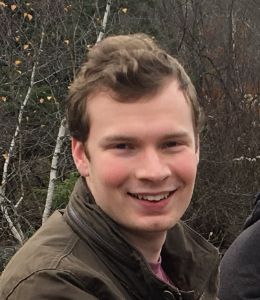Ben Hord, an NPP fellow looking toward the stars

Looking up at the night sky can make anyone feel small, but for Ben Hord, Ph.D., a NASA Postdoctoral Program Fellow, looking at the sky is also a reminder of how much there is left to discover, and how many people can be part of that journey. In this episode of Further Together, Hord discusses his research, his career trajectory, how he became a scientist and more.
Transcript for the episode (.DOCX)
Center: Goddard Space Flight Center
Looking up at the night sky can make anyone feel small—but for NASA postdoctoral fellow Ben Hord, it’s also a reminder of how much there is left to discover, and how many people can be part of that journey.
Ben is in his second year of his NASA fellowship, working on a project that sounds like something out of science fiction: the Pandora SmallSat mission. Set to launch in fall 2025, Pandora will study at least 20 exoplanets, planets outside our solar system, and their stars to figure out what their atmospheres are made of.
“We’re trying to separate the star’s light from the planet’s light,” Ben says, “so we can be sure when we’re seeing things like water.” It’s cutting-edge research that could help us figure out not just what these far-off planets are made of, but whether any of them could support life.
For Ben, the science is exciting, but so are the bigger questions behind it. Why does life exist on Earth and not anywhere else?
“It’s kind of personal,” he says. “To really understand who we are, we need to understand what else is out there.” He compares it to walking through a dark forest: “We don’t want to leave it dark. We want to shine a light and see what’s there.”
Ben didn’t always plan on becoming a scientist. In fact, astronomy wasn’t even on his radar at first. In his undergraduate studies, Ben started looking into astrophysics—something that had always fascinated him. A basic physics class sparked his interest, and suddenly, the stars he’d only thought about in the background became his focus. He ended up double-majoring in astrophysics and history, then earned a Ph.D. in astronomy from the University of Maryland, followed by a competitive NASA fellowship.
But Ben’s journey wasn’t all smooth sailing. “I heard ‘no’ a lot,” he says. One major turning point came during his time at Columbia University, when he was trying to find summer research. He sent out a bunch of rushed written emails, most of which were ignored. But one professor, Chuck Haley, replied. Not with a job, but with a tough critique. Ben took the feedback seriously, rewrote his materials, and sent them back. Haley agreed to meet. Their first meeting was intense. “He asked me, ‘What’s your defect?’ I didn’t know what to say.”
Despite the slow start, Ben ended up thriving under Haley’s mentorship and contributed to several research papers, even one published in Nature. “They told me later they didn’t expect much from me,” Ben says with a laugh. “But I proved them wrong.” That experience taught him something important: “You have to push through a lot of rejection to get to the one yes that matters.”
Today, Ben brings that same determination to his work—especially when it comes to making science accessible to everyone. He’s a big supporter of citizen science and is part of Exoplanet Watch, a project where amateur astronomers help professionals by collecting data. “Some of them get amazing results,” Ben says. “Honestly, they sometimes know more about observing than I do.” These volunteers help fine-tune the timing of when exoplanets pass in front of their stars, information that’s key for scheduling precious time on major telescopes like the James Webb Space Telescope.
Even people without telescopes can get involved by analyzing data that’s already been collected. “Science is more open than people think,” Ben says. “Anyone can be a scientist.” He hopes that message reaches young people, whether they go into science or just look up at the stars with a bit more wonder.
When asked what advice he’d give to future scientists, Ben is straightforward: “Don’t give up but be okay with changing direction if something isn’t right.” He also stresses the importance of diving in. “Get hands-on with data and code. It’s intimidating, but that’s the heart of what we do.”
For someone who heard a lot of “no,” Ben has excelled in his career. He’s now part of one of NASA’s most exciting missions. Still, he doesn’t take himself too seriously. At a recent conference, someone recognized him as “the mastermind of WASP-132 c,” a planet he helped discover. Ben just laughed. “I press buttons and make the computer go beep boop. ‘Mastermind’ feels like a stretch.”
What really makes Ben happy is helping others understand the universe. “It’s like lighting a candle,” he says. “My flame doesn’t get smaller by lighting someone else’s.” Whether he’s talking to students or working with citizen scientists, Ben’s mission is clear: to connect people to science and to the stars.
The NASA Postdoctoral Program (NPP) offers unique research opportunities to highly-talented U.S. and non-U.S. scientists to engage in ongoing NASA research projects at a NASA Center, NASA Headquarters, or at a NASA-affiliated research institute. These fellowships, awarded annually up to three years, are competitive and are designed to advance NASA’s missions in space science, Earth science, aeronautics, space operations, exploration systems, and astrobiology.
